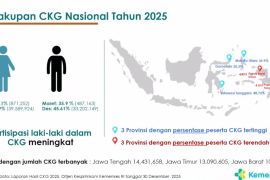At a talk show on Thursday, the minister noted that families in Indonesia, with a smoker member, usually spent their money to buy three packs of cigarette per day. Late last year, at a meeting with the House of Representatives (DPR), Finance Minister Sri Mulyani Indrawati noted that poor families spent Rp246,382 (US$16.21) on an average per month to purchase cigarettes.
“Hence, I appeal to the families to stop smoking, so they can buy eggs as an important nutritional intake for children," Sadikin remarked at the talk show titled “Animal Proteins for Stunting Prevention.”
The minister said that milk, fish and meat can also be consumed for ensuring intake of animal protein. Nutritional intakes provided during pregnancy and after the infants completed the exclusive breastfeeding period were important to prevent stunting in children, he emphasized.
The health minister urged all families in Indonesia to spend on the nutritional needs of children and pregnant women rather than on cigarettes. He also appealed to the public to ensure that fetal malnourishment did not occur. Moreover, he reminded that pregnant women should not be undernourished and anemic.
Meanwhile, National Population and Family Planning Agency’s (BKKBN's) Deputy for Training, Research, and Development Muhammad Rizal M. Damanik cited data while highlighting that household spending on cigarettes was far higher as compared to that on nutritious food.
"It (the less spending on nutritious food) is unfortunate, considering stunting is a (physical) growth and development disorder caused by malnutrition or repeated infections. Cigarette is one of the factors that hindered the growth and development of infants," he remarked.
Baca juga: Udayana Central sebut prevalensi pengguna rokok elektrik meningkat
Baca juga: Benarkah vape lebih aman dari rokok konvensional?
Hence, Damanik has called on the Family Assistance Team (TPK) to further increase community counselling to disseminate information on the importance of consuming nutritious food and to persuade people to not spend on buying cigarettes.
"We should think about (the condition of people of) Indonesia in the next 20 years because stunting is an intergenerational problem. If there are many babies, who are stunted now, then it will be a problem for future generations. Thus, it is very important to tackle the stunting problem (now)," he emphasized.
Pewarta : Hreeloita Shanti, Uyu Liman
Editor:
I Komang Suparta
COPYRIGHT © ANTARA 2026









